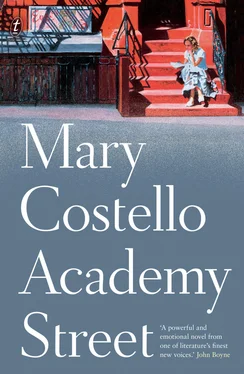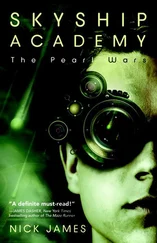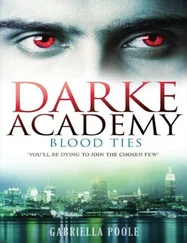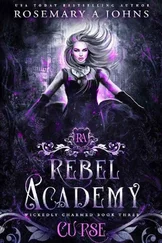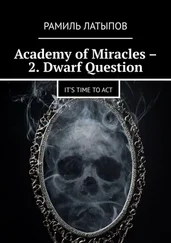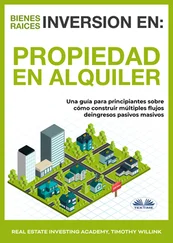Mary Costello - Academy Street
Здесь есть возможность читать онлайн «Mary Costello - Academy Street» весь текст электронной книги совершенно бесплатно (целиком полную версию без сокращений). В некоторых случаях можно слушать аудио, скачать через торрент в формате fb2 и присутствует краткое содержание. Год выпуска: 2014, Издательство: Text Publishing Company, Жанр: Современная проза, на английском языке. Описание произведения, (предисловие) а так же отзывы посетителей доступны на портале библиотеки ЛибКат.
- Название:Academy Street
- Автор:
- Издательство:Text Publishing Company
- Жанр:
- Год:2014
- ISBN:нет данных
- Рейтинг книги:3 / 5. Голосов: 1
-
Избранное:Добавить в избранное
- Отзывы:
-
Ваша оценка:
- 60
- 1
- 2
- 3
- 4
- 5
Academy Street: краткое содержание, описание и аннотация
Предлагаем к чтению аннотацию, описание, краткое содержание или предисловие (зависит от того, что написал сам автор книги «Academy Street»). Если вы не нашли необходимую информацию о книге — напишите в комментариях, мы постараемся отыскать её.
J.M. Coetzee
Academy Street This is an intimate story about unexpected gifts and unbearable losses, and the perpetual ache for belonging. It is exquisitely written and profoundly moving.
Academy Street — читать онлайн бесплатно полную книгу (весь текст) целиком
Ниже представлен текст книги, разбитый по страницам. Система сохранения места последней прочитанной страницы, позволяет с удобством читать онлайн бесплатно книгу «Academy Street», без необходимости каждый раз заново искать на чём Вы остановились. Поставьте закладку, и сможете в любой момент перейти на страницу, на которой закончили чтение.
Интервал:
Закладка:
There was no sign of Monkey. She stood often at her window looking down on the enclosed courtyard with the single tree. Sometimes at dusk she thought she saw him moving in the boughs. She could not sleep. The tolling of bells made her cry. She was always a heartbeat away from brokenness. Does the body go on feeling after death?
She walked a lot, mostly in the evenings. Her feet led her back to Academy Street. She stood on the sidewalk, keeping vigil. She looked up at her old window. There, she had been happy. There, where the air of the outside world did not infiltrate. She lingered, as if waiting for a flare from the window, a sign for where to go next. One afternoon she stood across from the school, under a tree, as parents gathered at the door. In an upstairs classroom, the lights were on, the heads of children visible and, as she watched, a little hand was raised in answer, lowered again. One day from a bus she saw him. She got off and rushed back, her heart beating wildly. She searched the street, frantic, peered into stores. Back and forth she trudged along the pavement, crying. She entered a church where a congregation was gathered for a funeral. She sat in a pew, stood, knelt, prayed for the dead man whose photograph sat on the coffin. At the end, with incense wafting in the air, she stepped into the aisle and walked with the mourners behind the coffin.
The talk was relentless. On the TV, the radio, in the streets — everywhere — the clamour, the arguments, the outrage, the heroes and the villains, all tormenting her. She wanted none of it, wanted the world to go mute. At night it rained. In the mornings the city gleamed. She tried to return to her books, but had little will. She was afraid of certain thoughts, of being devoured by certain thoughts. She began to dread nightfall, heartbreaking twilights. She drew down the blinds, shut out the city. His name resounded in her rooms, in her footsteps, a chant, an echo, a hide-and-seek cry. The-o, The-o.
‘Do you believe in an afterlife?’ she asked Willa. It was December and she had gone to visit Darius. She sat by his bedside. His skin was stretched dry and tight over his bones, his voice little more than a whisper. Afterwards she and Willa walked in the park. It was cold. The cold got into her bones these days. She had been wondering lately about God, if He had been merely a habit in her life. ‘Or do we only have this life?’
Willa considered the question. ‘Oh, God, Tess, if there’s no afterlife…I don’t know.’
They walked on in silence. She pulled up her collar. When he was small she had told Theo about Claire, his aunt in Heaven. For a while afterwards, he had been obsessed with Heaven. Will you be you and I be me in Heaven? How will I find you in the crowd? Will we be jealous in Heaven?
No, Theo, there’s no jealousy in Heaven.
‘Maybe I’m just a coward,’ Willa said. ‘But I’m hedging my bets. Why — what are you thinking, Tess?’
She had always had an inkling, an awareness of something other. God, she supposed. Even as a child, she had been in the habit of awe, drawn to the sacred, to lyrical intuitions and distant heavens. She thought of her mother and father now. She would, if she were to meet her father again, be a little afraid. In his presence she would be a child again.
‘I don’t know. Life goes by so quickly. Nothing seems to make much sense any more. But I have to believe, Willa. I have to believe. Because I cannot bear the thought of never seeing Theo again.’
She began to cry inside. If he had died young, if he had drowned in the pond that day, how much he would have been spared. He would have been spared his catastrophic ending. As it was, now, he had been spared old age. She remembered patients nearing the end in the hospital and the great effort, the immense straining, that each body made to hold on to life. Had his life, his thirty-seven years, counted for something? Had it been enough?
They came upon a dead bird on the path, tiny, stiff, its little chest upturned to the world. They stood before it in silence. She was arrested by grief, and pity. Willa poked it with her shoe, and then withdrew, her thoughts likely with Darius then. She would soon be his widow, his witness on earth. There was no name for what she, Tess, was: an old childless mother. There would be no witness to her life. No Claire, no Theo. Oliver was probably gone too, lying in some potter’s field.
She spent Christmas with Jennifer and the children. They would soon forget her, drift from her life. One night in January, she woke in the dark. A shadow crossed the room. Theo, come in search of the missing half of his soul, she thought, yearning to be reunited. She remained very still, waiting. With every breath she edged a little closer to her last. Please.
In the morning the light was different. She turned her head. There, outside on the window ledge, sat Monkey. She jumped out of bed and let him in. Warily, he watched her. Then he came and rubbed against her legs, and when she bent to stroke him, her tears flooded back.
Snow fell at Easter. On the streets the wind buffeted from all sides. One morning, the seasons changed. In her kitchen she brewed coffee, split an English muffin, slid it into the toaster. The radio was on.
She poured her coffee, raised her mug. Could a woman sit in her kitchen and drink coffee and wait for a muffin to pop in her toaster, and then smother it with apple jelly and bite into it and not weep for her dead son lost beneath the rubble? Could she listen to the news, the weather, the stock reports, the live phone-ins full of grief and outrage, and mentally calculate what her stock was worth? And still be a mother?
The pale sun streamed in, fell on the pot of jelly, and for a second she felt herself halted. In all her life she had never really known what to do or how to act. She had always been waiting for something or someone to guide her, and age had not altered that essential self.
∼
She returned, once, to Easterfield. It was May and she went back for Denis’s funeral. His son Michael met her at Shannon and swept her along newly built motorways, through towns and villages whose names she could barely recall. He turned onto the avenue at Easterfield and they drove slowly in dappled light under the trees. She would know this place anywhere on earth. She would feel it forever in her bones, every stick and stone of it.
The old house was gone. Denis had built a bungalow thirty years earlier and they were all assembled there. Evelyn, Maeve, widows now, their families. Denis’s widow, his grown children, all seated around the coffin. Grandchildren wandering in from the garden. They all embraced her. Her sisters cried, whispered, ‘Sorry.’ She touched Denis’s cold hands and blessed herself.
She could not, at first, find her bearings. She felt herself among strangers, kind curious strangers. She sat in the unfamiliar kitchen and the talk flowed, words upon words. She wondered if the past was real at all, and what, if anything, remained of it, apart from pain, the memory of pain — its vestiges, like old stumps. She thought how distant the dead had become, lost in the haze of time, the disappeared. Theo had not disappeared. He was close, even as she sat there, as close to her as her jugular vein.
Evelyn looked at her. ‘You never found Oliver,’ she said.
She shook her head. She stood accused, and somehow culpable. But Evelyn took her hand. ‘Claire, Oliver…And your own boy, Tess…all gone, and so young…Do you know what? All America ever brought this family was misfortune.’
In the afternoon people came to pay their respects. She walked outside. All of the outbuildings — the coach house, the barns, the arch leading to the orchard — were intact. She felt at a loss for the house but she could not blame Denis — it had been impossible to maintain, and had fallen derelict and dangerous after they had moved out. One does one’s best for one’s family.
Читать дальшеИнтервал:
Закладка:
Похожие книги на «Academy Street»
Представляем Вашему вниманию похожие книги на «Academy Street» списком для выбора. Мы отобрали схожую по названию и смыслу литературу в надежде предоставить читателям больше вариантов отыскать новые, интересные, ещё непрочитанные произведения.
Обсуждение, отзывы о книге «Academy Street» и просто собственные мнения читателей. Оставьте ваши комментарии, напишите, что Вы думаете о произведении, его смысле или главных героях. Укажите что конкретно понравилось, а что нет, и почему Вы так считаете.
